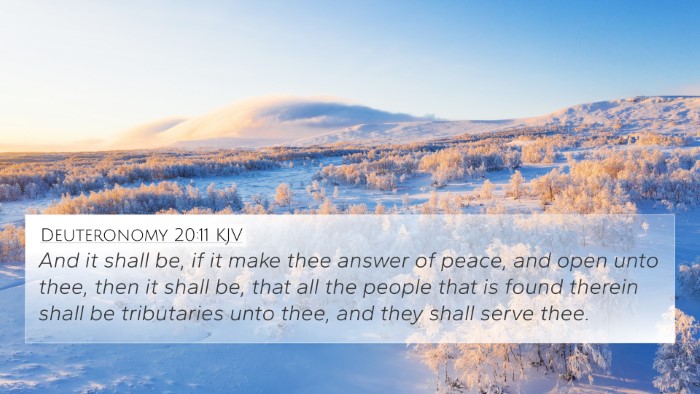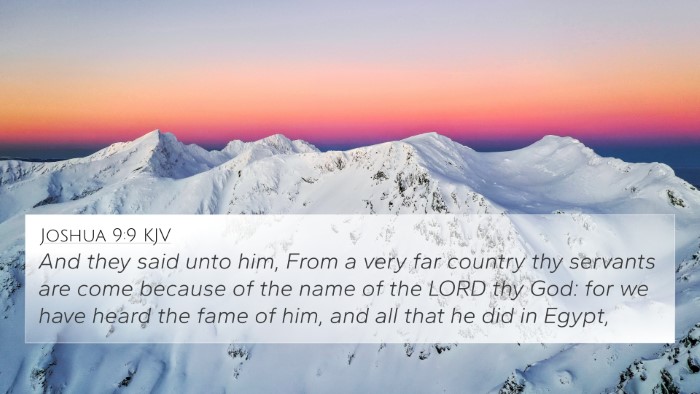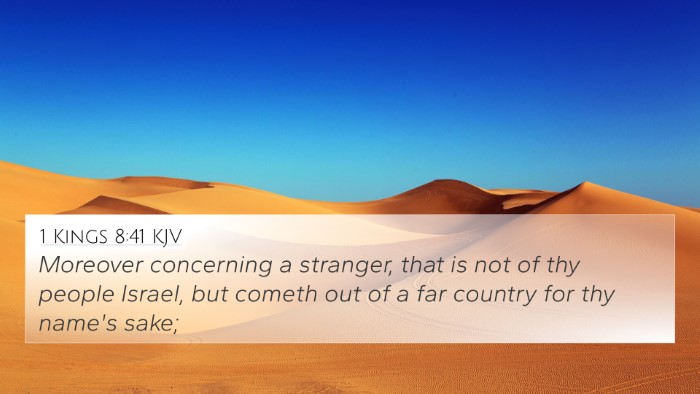Understanding Joshua 9:6
Joshua 9:6 states:
"And they went to Joshua unto the camp at Gilgal, and said unto him, and to the men of Israel, We be come from a far country: now therefore make ye a league with us."
This verse captures a pivotal moment in Israel's history as the Gibeonites approach Joshua and the Israelites, seeking to forge an alliance. The context is crucial for grasping the significance of their claim and the ensuing decision made by Israel.
Summary of Insights
The following insights are drawn from public domain commentaries including those by Matthew Henry, Albert Barnes, and Adam Clarke:
Contextual Background
In the previous chapters, Israel had been conquering cities in the Promised Land. The Gibeonites, owning their fear of Israel's God and the fate that befell Jericho and Ai, sought a strategy that would protect them from being destroyed. They feigned to be ambassadors from a distant land, a deception aimed at ensuring their survival.
The Significance of Alliances
The negotiation of a league or covenant signifies the central role alliances played in ancient Near Eastern politics. The Gibeonites’ approach illustrates a form of diplomatic maneuvering, highlighting the themes of wisdom and the consequences of choices made out of fear rather than faith.
Spiritual Lessons
There are several spiritual lessons from Joshua 9:6:
- Perception versus Reality: The Gibeonites dressed up their true intentions and origin, a reminder to readers about the necessity of discernment in relationships.
- Impact of Fear: The Gibeonites' fear of Israel prompted them to seek a seemingly pragmatic solution, leading to unforeseen consequences for the Israelites.
- Consequences of Covetousness and Dishonesty: This scenario serves as a warning against making alliances that may be based on deceit or ulterior motives.
Bible Cross-References
This verse relates to several other scriptures that offer deeper understanding or thematic connections:
- Joshua 9:1-3: The introduction to Gibeon's strategy to deceive Israel.
- Exodus 23:32-33: God's warning against making covenants with the inhabitants of the land.
- 1 Kings 9:21: A mention of the Gibeonites' servitude in later Israelite history.
- Deuteronomy 7:2: Command to make no covenant with those nations.
- Joshua 10:2: The fear of Gibeon being highlighted in the aftermath of the alliance.
- 2 Samuel 21:1: The repercussions of this covenant years later during David's reign.
- Matthew 10:16: Jesus teaching to be wise as serpents, which can be reflected in the Gibeonites' cunning approach.
Thematic Connections
Joshua 9:6 encapsulates themes of:
- Deception: The ways in which individuals can manipulate situations for their benefit.
- Covenants: The seriousness of making agreements and their long-term implications.
- Fear: The driving force behind many human actions and the need for faith in God over fear.
- Divine Guidance: The necessity for seeking God’s counsel in decisions, particularly with critical alliances.
Conclusion
In summary, Joshua 9:6 provides significant lessons on human interaction, the weight of decisions influenced by fear, and the dangers that can arise from deceptive practices. As we explore the connections between this verse and others in scripture, we deepen our understanding of God's expectations in our relationships and decisions.








